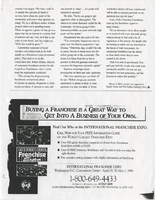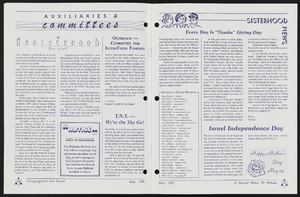Search the Special Collections and Archives Portal
Search Results
Vern Lanegrasse Papers
Identifier
Abstract
The Vern Lanegrasse Papers (1961-2010) consist of materials from the Brotherhood of the Knights of the Vine and the California Restaurant Writers Association as well as event programs, menus, and other materials related to food and wine.
Archival Collection
Stephen Nasser Papers
Identifier
Abstract
The Stephen Nasser Papers (1992-2018) mainly contain letters written from school children to Nasser who travels to schools, churches, and organizations around Las Vegas, Nevada to share his story of surviving the Holocaust during World War II. Materials in this collection document his captivity in various prison camps and includes photographs, awards, and newspaper clippings. Also included are speeches given by Nasser and book reviews and a teacher's guide of his book My Brother's Voice written by students of Dixie College, St. George, Utah. This collection includes a copy of
Archival Collection
North Las Vegas Chamber of Commerce Records
Identifier
Abstract
The North Las Vegas Chamber of Commerce Records documents the activities of the North Las Vegas Chamber of Commerce in southern Nevada from approximately 1970 to 2007. The majority of this collection is comprised of photographs and scrapbooks documenting North Las Vegas Chamber of Commerce member events. The collection also includes business guides, event invitations, and issues of the organization’s monthly newsletters,
Archival Collection
Aaron Williams Photograph Collection
Identifier
Abstract
The Aaron Williams Photograph Collection (approximately 1968 to 1983) consists of three black-and-white photographic prints. Two of the images are of the groundbreaking ceremony of the Senior Citizens’ Center with Las Vegas, Nevada Mayor Oran Gragson, and the third of three unidentified individuals.
Archival Collection
Jeanne Russell Janish Photograph Collection
Identifier
Abstract
The Jeanne Russell Janish Photograph Collection (1918-1974) consists of 48 black-and-white and color photographic prints that feature Janish's family, her husband Carl Janish, family homes and pets, and travel photographs from the United States, China, and South America.
Archival Collection
Joseph LaMar Foremaster Photograph Collection
Identifier
Abstract
The Joseph LaMar Foremaster Photograph Collection includes black-and-white photographic prints and negatives of structures at the Old Ranch (Stewart Ranch) in Las Vegas, Nevada from approximately 1920 to 1939 when the Foremaster family lived and worked on the land.
Archival Collection

Transcript of interview with Sari and Paul Aizley by Claytee D. White, November 4, 2016
Date
Archival Collection
Description
As Sari and Paul Aizley recall their separate childhoods and journeys to Las Vegas, their work and volunteer histories, their efforts to build a better society, and their life together they speak to each other as much as they respond to questions about their observations on the growth of the Las Vegas urban environment and their contributions to Southern Nevada's cultural development and a just society. In this interview, Sari and Paul speak to the cross-town commute and the physical UNLV campus in the late 1960s; the growth of the UNLV Math Department; the evolution of UNLV's Continuing Education; the State's North-South funding rivalry as reflected in the built environments of University of Nevada in Las Vegas and in Reno; plans to build a paleontology research facility at Tule Springs National Monument; the Review-Journal's "Ask Jessie Emmet" Real Estate column; local ACLU offices and politics; Fair Housing; transgendered persons; the Nevada State Assembly, and Class! magazine for Clark County high school students. Sari and Paul smile at each other as they recall how the editor/publisher met the bearded math professor and fell in love—despite the fact that they tell slightly different versions of their initial meeting(s). Sari passed away November 1, 2017, three days shy of one year after she participated in this interview.
Text

Nick Robone oral history interview: transcript
Date
Archival Collection
Description
Oral history interview with Nick Robone conducted by Claytee D. White and Barbara Tabach on December 21, 2017 for the Remembering 1 October Oral History Project. In this interview, Nick Robone, born and raised in Nevada, details his process of healing after being shot during the 2017 Las Vegas mass shooting at the Route 91 Harvest music festival. He discusses the events of that Sunday night and how he has learned to view life in a more positive light. Robone mentions various coping mechanisms that have helped him, including being open about his experience and talking about it with other survivors as well as pursuing his passions.
Text


